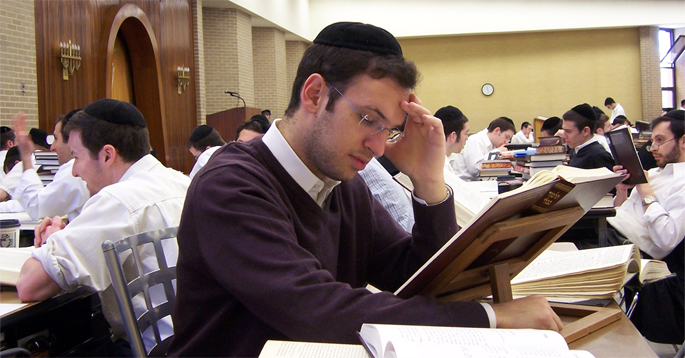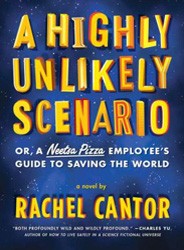Rachel Cantor is the author of the novel A Highly Unlikely Scenario, or a Neetsa Pizza Employee’s Guide to Saving the World. With the publication of her second novel, Good on Paper, she is blogging here all week as a Visiting Scribe on The ProsenPeople.
I didn’t set out to write a rabbi character when I started writing my novel Good on Paper. What do I know about rabbis? I have rabbi friends, but Benny isn’t modeled after anyone. He is a no-longer-large man who, when younger and strapped for cash, got seasonal jobs playing Santa (he was fired when he wouldn’t remove his tzittzit); now he runs through Central Park every day in his cherry-red bodysuit.
No, Benny isn’t anyone I know. He runs a bookstore on the Upper West Side known as People of the Book; it’s known for its a Great Wall of Poetry, also its pyramid of literary magazines. He can name the last title in the Nancy Drew series, both alphabetically and chronologically. His store features shelves with labels like Games People Play and All Things Green (books on the environment, money, and “envy management”). He is himself (of course) a failed poet, and editor of a failing literary magazine called Gilgul, named after the soul reborn in another body.
Though of varied interests, Benny is definitely a rabbi. He is ordained; he has parishioners, presumably through a havurah or alternative minyan; he leads High Holiday services; he presides over weddings (pocketing knishes to share with my narrator) and acts as a virtual mohel (for those who “want the celebration without the slice”). He knows his Tanakh; he wants to “learn” — i.e., study Torah — with my narrator; he automatically thinks about words in terms of their Gematria.
 So why a rabbi? I wasn’t trying to make any kind of theological point. My narrator Shira is, to say the least, a secular Jew. She imagines that her mother, who abandoned her when Shira was a child, was Catholic because, when they lived in Rome she visited lots of churches. She doesn’t know for sure — frankly, she doesn’t care. Shira experiences no religious conversion or Jewish awakening as a result of [spoiler alert!] falling for Benny. I had no such agenda.
So why a rabbi? I wasn’t trying to make any kind of theological point. My narrator Shira is, to say the least, a secular Jew. She imagines that her mother, who abandoned her when Shira was a child, was Catholic because, when they lived in Rome she visited lots of churches. She doesn’t know for sure — frankly, she doesn’t care. Shira experiences no religious conversion or Jewish awakening as a result of [spoiler alert!] falling for Benny. I had no such agenda.
The origin of a novel’s elements are often mysterious, perhaps especially to an author. Looking back now, at the finished book, I think I was attracted by the idea of a man who is “supposed to be” certain about matters of faith, but is in fact extremely human, with all a human person’s foibles, flaws, and, yes, doubts. Benny preaches forgiveness during the Days of Awe, but he is unable himself to forgive; he yearns to set an example, but again and again he errs. At the same time, his very Jewish questing, his yearning and openness, open something in Shira. It proves to make all the difference.
Rachel Cantor’s stories have appeared in magazines such as the Paris Review, One Story, Ninth Letter, Kenyon Review, and the New England Review. Rachel lives in New York, in the writerly borough of Brooklyn. She is, always, at work on another book.
Related Content:
- Jay Neugeboren: A Rabbi’s Tale
- Sara Davidson: How the Rabbi Hooked Me
- Rabbi Lawrence Hajioff: A New Take on Old Classics: How a Rabbi Approaches Challenging Questions




